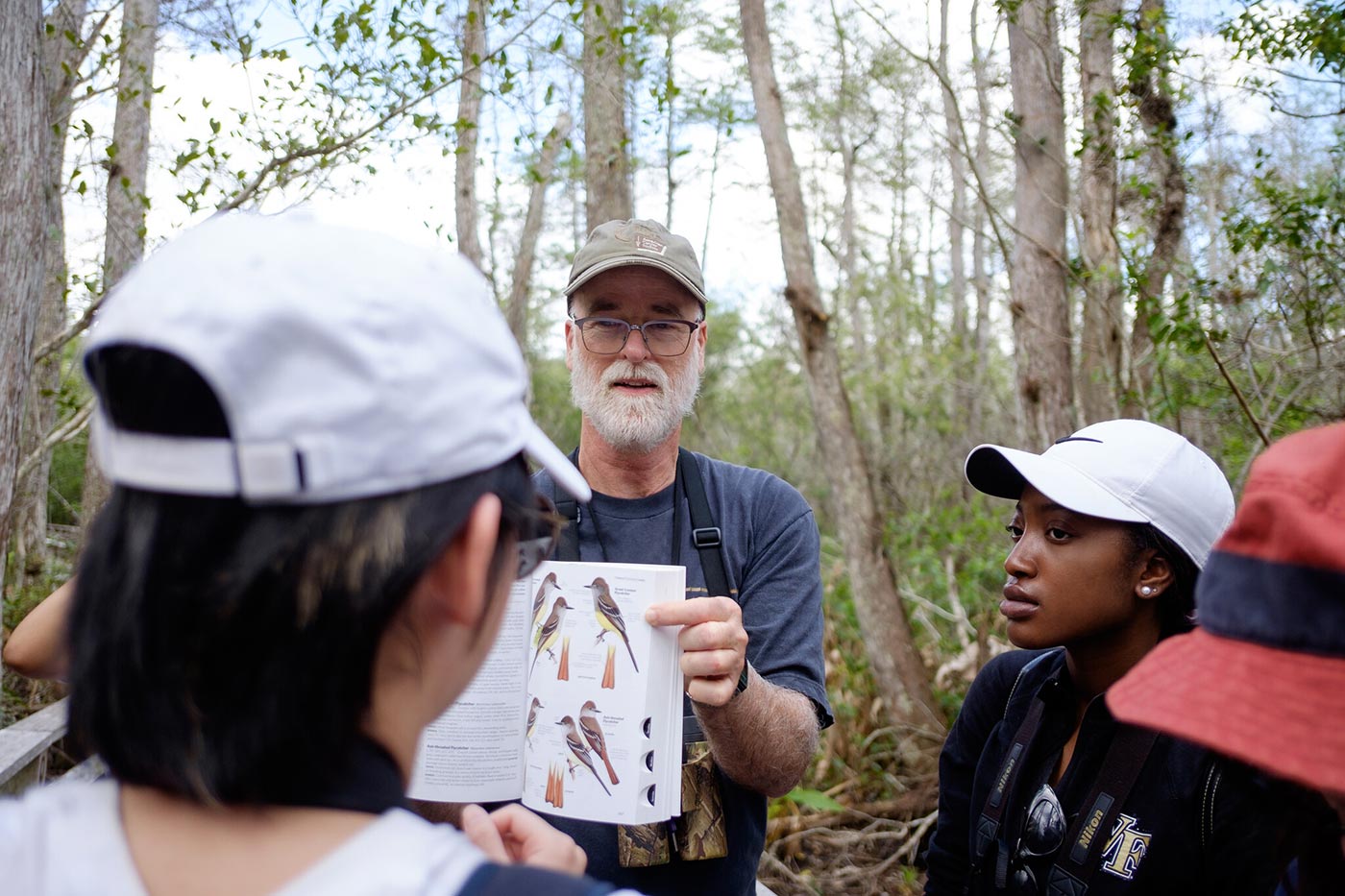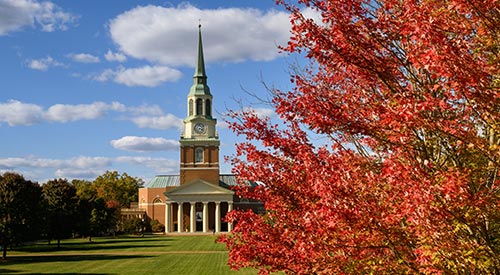Biology

Biology Degree
Bachelor of Science, Bachelor of Arts, Minor
Program Type:
Major, Minor
Career Path:
STEM (Science)
Program Site:
College or School:
Why study Biology?
Biology encompasses the study of all living organisms, including microbes, plants, and animals. The study of biology includes various aspects of life; including basic organization (molecular, cellular, tissues, organs), how organisms function and their roles in the natural environment, how hereditary information is transferred, and development of biotechnology.
Wake Forest was the first college in the South to teach biology in a laboratory. In recent years, the Biology department, its faculty and students have benefited from the renovation of the main Reynolda Campus facility and the opening of a new one, the biomedical center at Wake Downtown, a 13-minute shuttle ride away.
- Students declaring their primary major in Biology lead the way in faculty-mentored presentations at Undergraduate Research Day, the Celebration of Collaboration that coincides with Family Weekend. In the past 12 years, Biology majors have accounted for 15% of all presentations.
- In the past 10 graduating classes (2016-25), Biology has been the seventh most popular major overall and the fifth most popular in Wake Forest College, accounting for 8.13% of all graduates and 6.89% of all declared majors.
- Dr. Miles Silman is one of the world’s leading experts in efforts to preserve Amazon forests.
The Biology degree is offered as a Bachelor of Science (B.S.), Bachelor of Arts (B.A.), and a minor.
What classes would I take?
Our model and curriculum educate the whole person and often help students discover interests they had never previously discovered. Students generally take 100-200 level courses during their first year of college, while registering for higher level courses as upperclassmen.
Sample courses* that you may take as a Biology student include:
100-200 level
- Biology and the Human Condition
- Biological Principles
- Understanding Climate Change
- Biodiversity
- Genetics
300 level
- Comparative Anatomy
- Ecology and Conservation Biology of Coral Reefs
- Evolution
- Plant Physiology and Development
* Course availability and offerings can change at any time. Refer to the Academic Bulletin to view all major requirements.
What kind of experience will I gain?
Biology graduates are broadly trained and well prepared for admission into strong graduate programs in the biological sciences and professional schools (medical, dental, and veterinary). They may also directly assume positions in government, education, industry, or certain technical fields.
Students in this program will develop the following skills:
- Organizing ideas/information
- Applying scientific concepts to problems
- Making projections from data
- Ability to make critical observations and appropriate decisions
- Ability to operate scientific equipment
- Ability to organize and maintain accurate records
- Ability to conduct and clearly explain scientific research
Are there extracurricular activities?
Joining a club or organization is a great way to get involved and do more with your major. Our Biology students participate in the following programs:
- Beta Beta Beta
- Bioethics Club
- Association of Pre-Physician Assistants
- Health Occupation Students of America
- Women in STEM
What kind of job can I get?
Careers that often interest Biology majors, and fields our graduates work in, include:
- Biochemist
- Bioinformaticist
- Blood Bank Technologist
- Clinical Pathologist
- Crime Lab Analyst
- Cytotechnologist
- Dentist
- Dietician
- Educator
- Environmental Specialist
- Field Study Coordinator
- Food and Drug Inspector
- Genetic Counselor
- Health Program Assistant
- Hemotherapist
- Histologist
- Lab Technician
- Legal Assistant
- Medical Equipment Sales
- Medical Investigator
- Medical Librarian
- Medical Writer
- Microbiologist
- Optometrist
- Parasitologist
- Pharmaceutical Sales Representative
- Physical Therapist
- Physician
- Physician’s Assistant
- Public Health Specialist
- Quality Control Specialist
- Toxicologist
Although many Biology graduates enjoy successful careers in medical fields, they are also attorneys; ministers; financial advisors; and involved in dozens of other specialties.
Related Programs

Majors & Minors
Choose from more than 50 majors and over 60 minors to find your perfect fit.

Life at Wake
Take a moment to explore all the student experiences that make Wake Forest unique.

Virtual Tour
Can’t make it for a visit? No problem! Let us show you around campus virtually.

Keep in Touch
Let us know you’re interested in Wake Forest and we’ll do the rest.

Visit Campus
You truly can’t appreciate the beauty of our campus until you experience it for yourself.

Apply
Want to be considered for our next class of Demon Deacons? Here’s how to get started.
